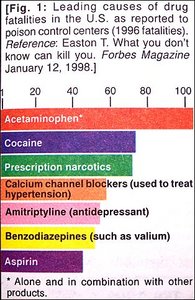For example, a 5-year-old was given four extra strength tablets in one day for the common flu. This was twice what a child should receive. The overdose destroyed this child's liver, and within a week she was dead.
Another 14-month-old nearly died from an overdose of Tylenol. The mother used the dosage scheme given by the infant's doctor. The trouble was that she gave the infant Tylenol infant drops but used the dosage for a different product, Tylenol children's suspension liquid. Looking at the packages of these products does not readily reveal that the infant drops are three times as potent as the children's formula.

Acetaminophen
Acetaminophen is a chemical similar to aspirin and has aspirin's ability to lower fevers and relieve pain. Unlike aspirin, acetaminophen does not tend to upset the lining of the stomach. It also lacks a side effect that makes aspirin a risk for children, the rare likelihood that a child taking aspirin during a spell of flu or a cold will succumb to the potentially fatal nervous system complication known as Reye's syndrome.
About sixty minutes after taking acetaminophen, the drug has reached peak blood levels and continues to the liver, where it is metabolized. About 5% of the drug is metabolized into a highly toxic compound, N-acetyl-para-benzoquinoneimine. Under ordinary circumstances, the toxicity is neutralized within the liver by glutathione. Unfortunately, acetaminophen overdoses overwhelms the available supply of glutathione, thus promptly leading to liver damage. Glutathione is also easily overwhelmed with lesser doses of acetaminophen for those who drink alcohol frequently or have been fasting.
Symptoms of Poisoning
The initial symptoms of acetaminophen poisoning are somewhat illusive because they are so similar to flu symptoms. Nevertheless, the warning signs are loss of appetite and nausea. To make matters even more difficult, for some these appear within the first day and then subside, thus leading the sufferer to the mistaken notion that the danger has passed.
In most cases, signs of liver failure arise in the first 48 hours with the onset of jaundice, confusion and in severe cases, coma.1 Acetaminophen overdose is generally treated with oral cimetidine, but it must be given within 12-24 hours.2
Aspirin
Aspirin is made from salicylic acid and found in the bark of a tree. It was used by the Greeks and Native Americans to cure fever and pain. Aspirin is a good medication, but for children it has a bad disease associated with it, namely, Reye's syndrome.
Do not give a medicine containing aspirin to a child with fever or other symptoms of a virus infection, especially flu or chicken pox. This is very important, because when aspirin is taken by children under these conditions, it may cause Reye's syndrome.
What Is Reye's Syndrome?
Reye's syndrome (pronounced as "rye") is a rare condition that can affect children from infancy through 19 years of age. When it occurs, it is considered life-threatening. Reye's syndrome affects the liver and the brain. It is noncontagious and is often misdiagnosed as encephalitis, meningitis, diabetes, poisoning, mental illness or, in teenagers, even drug abuse. Complete recovery is closely linked to early diagnosis. The child's physician should be contacted immediately if any of the symptoms described below develop.
Reye's syndrome is initially characterized by mild confusion and vomiting that tends to progress to disorientation and combativeness. If the child's symptoms do not progress any further, most children will recover without any problems. However, some children may progress to coma and death.
The first symptoms of Reye's syndrome usually appear two to seven days after a child has developed chicken pox or a viral respiratory infection and has taken aspirin. The early symptoms may consist of all or a few of the following:
- Forceful vomiting lasting for several hours, which gets worse instead of better;
- Severe headaches;
- Staring spells or a stupor;
- Fast, rapid breathing;
- Drowsiness;
- Memory loss and disorientation;
- Hallucinations; and
- Behavior which is aggressive or uncooperative.
How Is Reye's Syndrome Treated?
Early diagnosis and treatment is important. The greatest risk from Reye's syndrome is permanent brain and liver damage, but with early diagnosis, there is a 90 percent chance of full recovery.
There is no known cure for Reye's syndrome, and the treatment is symptomatic. The first priority is reversing swelling in the brain and the child may need to be placed on a respirator to provide adequate oxygen to body tissues.
References
- Roach JA, Stacey B. Acetaminophen toxicity. Orthop Nurs May 1997;16(3):49-53.
- Rolband GC, Marcuard SP. Cimetidine in the treatment of acetaminophen overdose. J Clin Gastroenterol Feb 1991;13(1):79-82.
Darryl Curl, DDS, DC
Norco, California
doc_curl-ix.netcom.com




